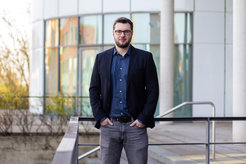MPI welcomes new Max Planck Research Group Leader Sidney Becker
Sidney Becker wants to kickstart evolution to understand how life evolved from pure chemistry
From January 2022 on Sidney Becker will start his independent Max Planck Research Group at the Max Planck Institute (MPI) of Molecular Physiology in Dortmund. His group will study the principles of molecular evolution by using chemical and biochemical methods. Leaders of these groups are appointed by the President of the Max Planck Society and – similar to directors at Max Planck Institutes – enjoy an independent status within the institute.
Sidney obtained a M.Sc. in Chemistry & Business Studies at the University of Zurich in Switzerland. He finished his PhD in the group of Prof. Thomas Carell at the LMU Munich in Germany, where he focused on the origin of RNA building blocks on the early Earth. After his time as a research associate in Munich, he went to Cambridge for his postdoctoral studies on the development of new concepts for sequencing of DNA modifications in the group of Sir Shankar Balasubramanian.

What will your lab research focus be and what lead you to this area of research?
Our group will use chemical and biochemical methods to investigate the principles of molecular evolution. We want to gain a better understanding of 1) how functional nucleic acids emerge, 2) how simple genetic systems could evolve into larger complexity and 3) the structural requirements and limits of genetic polymers. My vision is to create a synthetic self-replicator, capable of open-ended evolution. This might help us understand how life evolved from pure chemistry. Already during my PhD in the group of Thomas Carell, I was fascinated by the origin of life research. However, I decided to change the field in order to learn about DNA sequencing during my postdoctoral studies in the group of Shankar Balasubramanian. I believe my area of research combines both aspects – answering fundamental scientific questions with cutting edge technology.
This reminds me of the so-called primordial soup. Will you keep cooking soups yourself in the lab?
As PhD student, I tried to simulate the ‘primordial soup’ and we successfully showed how all four letters of the genetic alphabet could have been created from simple molecules. Our research now, however, starts with the subsequent steps when we assume the primordial soup is able to generate some kind of nucleic acid. We are looking at what happens next - how can we kickstart evolution? Nucleic acids alone do not make a genetic system. Only in combination with a replication mechanism, where information can be transferred, evolution can take place. Even though proteins contain sequence information as well, no one would consider them as genetic material. This is also part of the central dogma of molecular biology, which states that information can be translated from nucleic acids to proteins but you can’t recreate the original nucleic acid sequence from the protein sequence.
Why did you choose to establish your group at the MPI Dortmund?
I am an organic chemist by training but I specialized in the area of Chemical Biology, which is strongly represented at the MPI in Dortmund. I believe that Dortmund has the best mix to benefit my research: On one hand, I will get an excellent chemistry and structural biochemistry infrastructure. On the other hand, the origin of life research is strong at the institute since several groups are already part of the Matter to Life Max Planck School. The MPI Dortmund also offers much greater visibility compared to other large institutes. Finally, I need to say I was surprised when I first arrived in Dortmund – it’s a very green city with great living conditions.
What are you trying to achieve through your research and how is it going to impact science and society?
Despite many advances in the field of synthetic biology the most fundamental aspect of life, i.e. Darwinian self-replication, has not been recreated in the lab so far. This would be a scientific milestone and has far-reaching implications for the search of non-terrestrial living matter, synthetic life or the origin of life. Potential applications of our research are the development of innovative molecular tools for diagnostic or therapeutic applications. During the pandemic, everyone realised the potential of nucleic acid-based vaccines (mRNA). However, if we look at the best-selling drugs (“blockbuster”), they are mostly proteins or small molecules but we cannot find any nucleic acids. I believe this will change in the next ten to twenty years and I hope that we will contribute to this development.
How do you relax after a hard day at work?
It’s very hard for me to switch off because I often think about scientific problems. I best manage during cooking, where I can experiment with different tastes. However, cooking takes time so I don’t do it on a daily basis. Nevertheless, I also enjoy playing basketball and I hope that Dortmund offers some good opportunities to join a team.
